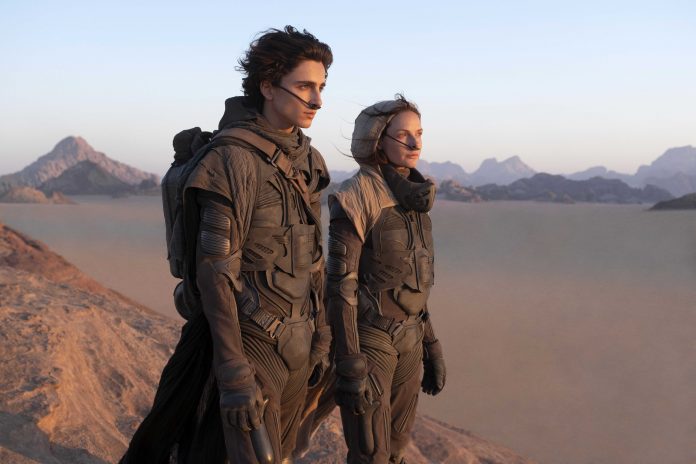
By JAKE COYLE
AP Film Writer
A cool wind sweeps through the sands of “Dune,” Denis Villeneuve’s chilly, majestic adaptation of Frank Herbert’s classic 1965 science-fiction novel.
Hot as it may be on Arrakis, the desert planet that draws the universe’s most powerful interests to its mineral-rich but inhospitable sands, Villeneuve’s film is a solemn slow burn. This “Dune,” a cool-headed colossus, erects a massive, brutalist architecture of otherworldly science-fiction to craft a big-screen spectacle of thundering splendor.
It is, to be sure, rather cool to the touch. Villeneuve does atmospheric exteriors more than he does emotional interiors. In muted monochrome shades, rich textures and deep sonic soundscapes, his specialty — already familiar in the deep shadows of “Sicario,” “Arrival” and “Blade Runner 2049” — is invoking a severe ominousness.
So “Dune” is a more somber trip into the desert than, say, the ferociously frenetic “Mad Max: Fury Road.” Its tale of oppression and messianic fervor, though, does — like the book — recall “Lawrence of Arabia.” Instead of Peter O’Toole and his aflame blue eyes laying siege at Aqaba, we have Timothée Chalamet seizing power, potentially, on Arrakis. There. Is. Another.
Herbert’s opus, forged out of the Cold War and dawning environmental dread, begat a cottage industry of sequels but has before now made curiously little headway into wider popular culture. David Lynch’s much-derided 1984 film, which even he disavowed, didn’t help. This version, which debuts Thursday evening in theaters and on HBO Max, is a second stab at turning “Dune” into a wide-screen event. And considering the dozens of entries in the book series, “Dune” could just as surely as the “spice” in the Arrakis sands be mined for more. “Dune” is optimistically subtitled “Part One,” adapting just the first half of the 1965 tome.
The easiest criticism of the film is that it doesn’t rise to a climax but withers away in the dunes. That bothered me less. I was transported enough to just hope “Dune” — which is well worth seeking out in theaters rather than at home — does well enough to lead to a part two.
Villeneuve has streamlined the book in a script by him, Jon Spaihts and Eric Roth. That has lost some of the novel’s eccentricities, but it has also made coherent an ambitious epic. Here, “Dune” is an operatic parable of power and exploitation, with an ecological resonance that’s only grown more relevant.
With a princely sense of destiny, Chalamet plays Paul, whose father Duke Leto (Oscar Isaac) is head of House Atreides, one of several governing fiefdoms. The spice on Arrakis, which makes interstellar travel possible and has other mind-expanding capabilities, has long been harvested by the fascist House Harkonnen, as overseen by Baron Vladimir Harkonnen (played by a grotesquely swollen Stellan Skarsgard, with nods to Marlon Brando in “Apocalypse Now”). But for unknown reasons, a switcheroo has been ordered.
Harvesting spice is no easy task, though. It’s oppressively hot. There are mammoth sandworms. And the local Fremen (among whom is Zendaya’s Chani) resent their “out-worlder” overlords. Leto hopes to begin a friendly collaboration with the Freman but quickly finds their operation sabotaged at every step. When things turn violent, attention turns to Paul, who has been trained in swordplay by Gurney Halleck (Josh Brolin) and mentored by his mother, Lady Jessica (Rebecca Ferguson, fabulous) in “the way” — a mysterious mind-controlling power. The Freman believe he could be a prophesied savior. Whether “Dune” will tweak the white savior set-up will ultimately, though, have to wait for a possible sequel.
The plot is enough for even a sandworm to digest. All the world building leaves only so much room for anything very intimate in character development. “Dune,” like most of Villeneuve’s previous films, is a little hollow beneath its immaculate surfaces. But those surfaces! With Greig Fraser’s cinematography and Patrice Vermette’s production design, “Dune” is so sublimely rendered that you could easily follow it with the sound off, sans Hans Zimmer’s hulking score. With an immense sense of scale ranging from mosquito to (Jason) Momoa, “Dune” renders an age-old tale of palace intrigue and indigenous struggle in exaggerated cosmic contours. Like any drift of sand, “Dune” feels sculpted by elemental, primal forces.
















